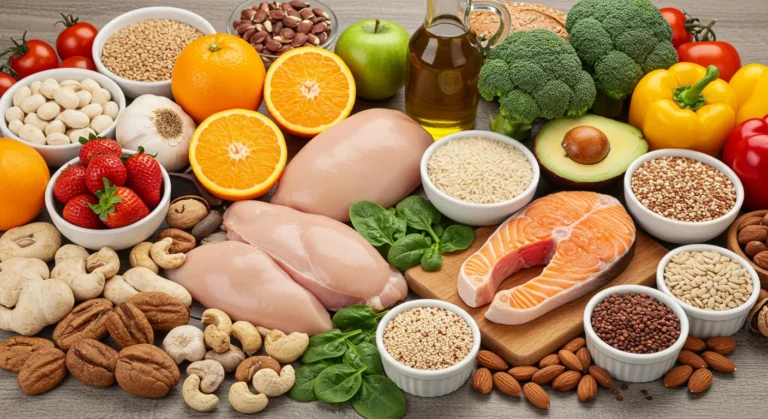Finding The Right One For Your Needs
Introduction
You’ve probably tried it all—low-carb, high-protein, fasting, meal plans, and maybe even some trendy detoxes. But if you’re still wondering, what is the best diet plan? you’re not alone. The truth is, there’s no single best diet that works for everyone. The key is finding a plan that fits your lifestyle, preferences, and health goals.
In this guide, we’ll break down popular diet plans, their pros and cons, and how to choose the right one for you. We’ll also look at why some diets fail and what makes a plan truly sustainable.
What Makes a Diet Plan Effective?
Before jumping into specific diets, let’s cover what actually makes a diet effective:
- Sustainability – Can you stick with it long-term?
- Nutrient Balance – Does it provide all essential nutrients?
- Caloric Control – Does it help manage portion sizes without extreme restriction?
- Flexibility – Does it fit your daily routine and preferences?
- Health Benefits – Does it support overall well-being?
If a diet checks these boxes, it’s more likely to lead to lasting results.

Comparing Popular Diet Plans
Here’s a breakdown of some of the most popular diet plans and what you need to know about them:
1. Mediterranean Diet
Overview: Based on the traditional eating habits of countries like Greece and Italy, this diet emphasizes whole foods, healthy fats, and lean proteins.
What You Eat:
- Fruits, vegetables, whole grains, nuts, seeds
- Olive oil as the primary fat source
- Fish and poultry
- Moderate dairy and red wine
Pros: ✔ Heart-healthy and backed by research ✔ Easy to follow without strict rules ✔ Rich in antioxidants and anti-inflammatory foods
Cons: ✘ Can be expensive due to fresh ingredients ✘ Limited dairy may not work for everyone
2. Low-Carb and Keto Diets
Overview: These diets focus on reducing carbohydrate intake to promote fat loss and regulate blood sugar.
What You Eat:
- High-fat foods like avocados, nuts, and oils
- Protein from meat, fish, and eggs
- Non-starchy vegetables
- Little to no grains, sugars, or high-carb fruits
Pros: ✔ Rapid weight loss in the early stages ✔ Helps control blood sugar levels ✔ Reduces cravings for processed foods
Cons: ✘ Can be difficult to maintain long-term ✘ May cause fatigue or digestion issues initially ✘ Restrictive food choices
3. Plant-Based Diets (Vegetarian & Vegan)
Overview: Focused on whole, plant-based foods while minimizing or eliminating animal products.
What You Eat:
- Fruits, vegetables, legumes, nuts, and seeds
- Whole grains and plant-based protein sources
- Minimal processed foods
Pros: ✔ Environmentally friendly ✔ High in fiber and nutrients ✔ Supports heart health
Cons: ✘ Requires careful planning to get enough protein and B12 ✘ Some may struggle with meal variety
4. Intermittent Fasting (IF)
Overview: Rather than focusing on what you eat, IF focuses on when you eat by restricting food intake to certain hours.
Common Methods:
- 16/8 Method: Fast for 16 hours, eat within an 8-hour window
- 5:2 Diet: Eat normally for 5 days, restrict calories for 2 days
Pros: ✔ Simplifies meal planning ✔ Can aid in weight loss and insulin sensitivity ✔ May support brain health
Cons: ✘ May cause hunger or fatigue initially ✘ Not ideal for everyone (e.g., those with medical conditions)
5. DASH Diet (Dietary Approaches to Stop Hypertension)
Overview: Originally developed to reduce high blood pressure, this diet emphasizes nutrient-dense, low-sodium foods.
What You Eat:
- Fruits, vegetables, lean proteins, whole grains
- Low-fat dairy
- Minimal processed and high-sodium foods
Pros: ✔ Supports heart health and reduces hypertension risk ✔ Well-balanced and easy to follow ✔ No extreme restrictions
Cons: ✘ Some may find it too low in fat for their liking ✘ Requires home cooking for best results

Which Diet Is Right for You?
Choosing the best diet plan depends on your lifestyle, health goals, and personal preferences. Here’s a quick guide to help you decide:
| Goal | Best Diet Options |
| Weight Loss | Low-Carb, Intermittent Fasting, Mediterranean |
| Heart Health | Mediterranean, DASH, Plant-Based |
| Muscle Gain | High-Protein, Balanced Whole-Food Diet |
| Sustainable Eating | Mediterranean, Plant-Based |
| Blood Sugar Control | Low-Carb, Keto, DASH |
Why Some Diets Fail (And How to Avoid That)
If you’ve tried multiple diet plans and none have worked long-term, you’re not alone. Here’s why diets often fail:
- Too Restrictive – If you cut out too many foods, cravings increase.
- Unrealistic Expectations – Quick results rarely last.
- Lack of Planning – Meal prep and balanced choices matter.
- One-Size-Fits-All Approach – Not every diet works for every person.
How to Succeed
- Find What Fits – Pick a diet that works with your lifestyle, not against it.
- Focus on Habits – Small, consistent changes lead to lasting results.
- Allow Flexibility – An occasional treat won’t ruin your progress.
- Track Progress – Keep a journal or use apps to monitor progress.

Final Thoughts
There’s no one-size-fits-all best diet plan. The key is choosing a sustainable, balanced approach that fits your goals and lifestyle. If you’ve tried everything from fad diets to more proven plans, consider focusing on long-term habits rather than quick fixes.
If you’re unsure where to start, the Mediterranean or DASH diet is a great foundation. And if you need structure, intermittent fasting or a low-carb approach might help.
Whatever path you choose, remember: consistency beats perfection.







